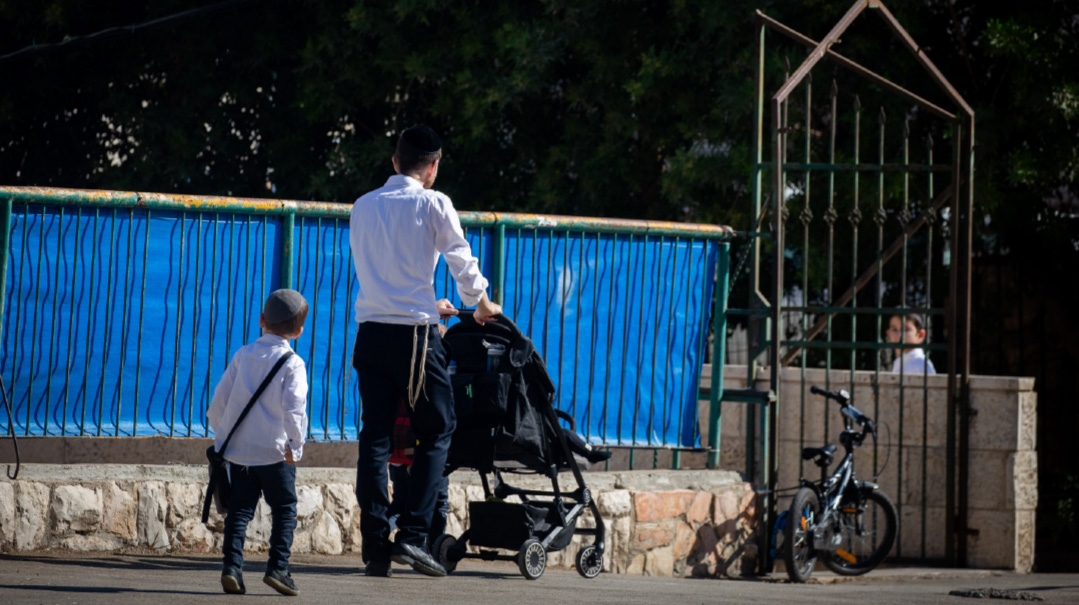Hitting Them in the Pocketbook

The attorney general’s campaign against Israel’s avreichim cranks up a notch

Photo: Flash90
T
he battle to draft chareidi yeshivah students into military service took a dramatic turn for the worse this week. In an unprecedented move, Attorney General Gali Baharav-Miara ordered Labor Minister Yoav Ben-Tzur to cut day care subsidies for the children of draft-eligible Torah learners.
A letter from Deputy Attorney General Gil Limon states: “Under current law, pursuant to the [High Court] ruling and the expiration of Article C1, the state is no longer authorized to incentivize the Torah study of draft-eligible men via day care subsidies, i.e., the lack of authorization does not permit subsidization on the basis of studying in a religious institution while being designated for security service.”
What Happened?
The attorney general’s move is a result of two rulings by Israel’s High Court in March and June. The High Court found that the state no longer has the authority to provide blanket deferrals to yeshivah students after a 2015 law regulating draft exemptions expired in June 2023. The attorney general’s letter came after she met with Labor Minister Yoav Ben-Tzur (Shas) on July 23. However, Ben Tzur had been trying to schedule that meeting for two months, as the school year drew to a close.
Who Will be Affected?
The decision will affect the wives of tens of thousands of avreichim under the age of 26, the cutoff age for draft eligibility. There are currently 66,000 bochurim and avreichim aged 18–26 who are legally designated for security service (“malshabim” in Israeli bureaucratese). Avreichim over 26 are legally exempt from military service and won’t be impacted by the decision. Until now, married yeshivah students whose wives work were entitled to state-subsidized day care for their children, allowing mothers to work full-time and pick up their children in the afternoon.
The Bottom Line
Day care costs in Israel are NIS 3,655 for a toddler under 15 months, NIS 2,812 for a toddler aged 15–24 months, and NIS 2,455 for a toddler over 24 months. Certain populations are entitled to state subsidies covering part of the expense. The scale of the subsidy is determined by the household’s income divided by the number of its members. To be eligible for the subsidy, both parents have to be either working or studying — which until now included studying in a kollel under Education Ministry supervision.
The attorney general’s argument is that the moment an avreich becomes draft-eligible, he’s no longer categorized as learning in a recognized institution, and thus forfeits his rights to the subsidy. The bottom line for young, low-income couples will be harsh.
For example, a couple with two children making a combined NIS 10,000 falls into category 4, paying just NIS 1,446 for a toddler under 15 months and NIS 1,136 for a toddler under 24 months — subsidies of 60 percent and 49 percent. If they’re forced to bear the full cost pursuant to the attorney general’s decision, they’ll have to pay an additional NIS 2,209 a month for a toddler under 15 months and NIS 1,676 for a toddler under 24 months. For a young couple, this could be insurmountable.
Is This Decision Legal?
It should be noted that in 2021, then-finance minister Avigdor Lieberman similarly canceled day care subsidies for avreichim with the declared goal of forcing them into the workforce. Lieberman announced the decision at about the same time of year, just before the end of the school year.
A lobby comprised of nonprofit day care centers and chareidi families filed an appeal to the High Court, arguing that it was unreasonable to announce the decision so close to the beginning of the upcoming school year. Registration for day care typically occurs in February and March, allowing the appellants to argue that the late timing made it impossible to prepare.
In January 2022, the High Court ruled that families’ rights to advance notice takes precedence over the state’s right to cancel subsidies. This ruling will likely be the precedent cited in appeals against the attorney general’s late decision today, especially since she avoided meeting Ben-Tzur to discuss the matter over the past two months.
Eichler’s Proposal
MK Yisrael Eichler, chair of the Labor and Welfare Committee, convened a special meeting for Wednesday after Tishah B’Av to discuss the violation of working mothers’ rights to day care subsidies. Among the invited are representatives of the Justice Ministry, the Attorney General, the Equal Opportunities at Work Unit, women’s rights groups, and others. The committee will consider whether the decision is legally viable, as well as ways to resolve the issue.
In addition, Eichler has asked for a special session during the recess to vote on a bill he wrote to address situations in which the rights of working chareidi women are tied to their husbands’ occupation. Previously, the High Court has prohibited denying a woman national insurance payments if her husband is convicted of terrorism or any other crime . Eichler’s bill aims to sever the connection between a working woman’s rights and her husband’s occupation, which should theoretically receive broad support from women’s rights groups.
The Finance Ministry opposes Eichler’s bill on budgetary grounds, not for any political reason. Eichler proposes passing the bill on first reading and then returning it to committee to work out a solution the Finance Ministry can accept.
Pass a New Draft Law
“We weren’t shocked,” says MK Yitzchok Pindrus, head of the Knesset’s Special Committee for Public Inquiries. “We know that until there’s a draft law that can make it through the Foreign Affairs and Defense Committee, they’ll try to affect the legal rights of anyone frum in Eretz Yisrael, and we’re going to find the legal avenues to fight it. The real solution is to pass a new draft law.”
Pindrus says he isn’t pinning his hopes on another High Court ruling like the one in January 2022, since there is no guarantee they’ll rule the same way this time. He says that Minister Ben-Tzur will have to see if he has a case, “but they’re going to do everything they can until the draft law is passed, so we have to pass it.”
(Originally featured in Mishpacha, Issue 1024)
Oops! We could not locate your form.







